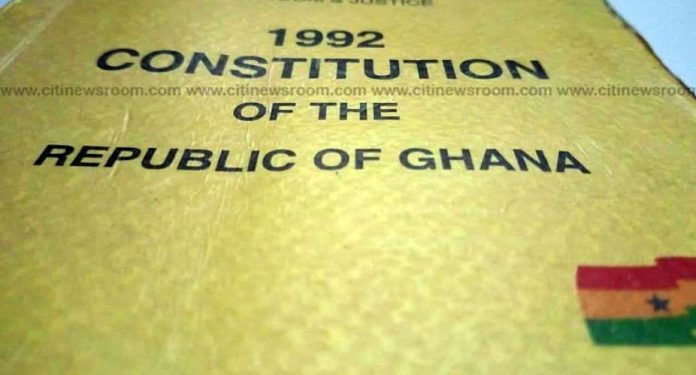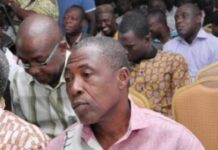It all started on a wrong foot, the 1992 Constitution. First instead of a constituent assembly, a consultative assembly was set up in 1991 to draft it. Being consultative, the assembly was only to make recommendations, which the leader of the ruling government may accept, reject or add on. This was the foundation our democracy was laid on. And yet, Ghanaians did not protest.
The composition of the assembly was another thing. Out of the 260-member assembly, 22 members were appointed directly by the ruling PNDC, 117 members were appointed from the MMDAs (Metropolitan/Municipal/District Assemblies and 121 members were from “identifiable bodies” or corporate groups.
Majority of those under the identifiable bodies, were so-called organs of the revolution and pro-PNDC organisations, namely the Committee of the Defense of the Revolution (CDRs), June Four Movement (JFM), 31st December Women’s Movement (DWM) and Ghana Private Roads Transport Union of TUC (GPRTU) including butchers, hairdressers, drinking bar operators among others had more seats than other representatives of identifiable bodies like the Ghana Bar Association (GBA), National Union of Ghana Students (NUGS), University Teachers Association (UTAG), Ghana Catholic Bishops Conference (GCBC) and the Christian Council of Ghana who were persistent in their demands for constitutional rule. They had one seat each. In total, the pro-PNDC members on the assembly far exceeded the pro-democracy ones.
GBA and NUGS protested, demanding more seats and when their pleas were not taken, the two bodies dropped out, leaving the Consultative Assembly with 258 members. It was clear that the constitution was going to favour one man, Jerry John Rawlings, the head of state. And yet, Ghanaians did not protest.
When the assembly finished its work and presented its recommendations to the PNDC, Jerry Rawlings had entrenched clauses added on. This included, the head of state or presidents being immune from persecution over their conduct in office. And yet, Ghanaians did not protest.
Finally, Ghanaians were asked to express their opinions on the document, in a referendum on April 28, 1992. It was a “Yes” or “No,” vote. With such opportunity to throw away the draft constitution and bargain for a better one, this was what happened. With 8,355,690 names on the register, only 3,680,974 or 44.59% turned out to vote. And 3,408,119 (92.59%) accepted that the draft was okay to become the Supreme Law of the country. 272,855 (7.41%) totally rejected it. And by the way, there was no invalid votes cast. But, how a referendum with less than 45% of eligible voters was allowed to determine the fate of the nation, leaves much to be desired. And yet, Ghanaians did not protest.
Strangely, Rawlings who the Constitution was made for, demanded its first amendment, so that the president could sack his vice-president. This was after the scuffle he had with Veep Arkaah during a cabinet meeting on December 28, 1995. This was not to be.
The Constitution continued to reign supreme from 1993 to this date, making the Fourth Republic the longest in our nation’s history. It was only after Rawlings had left the scene that coward Ghanaians started coming out of their holes to protest the Supreme Law. They will always blame politicians for clauses they consider unacceptable in the Constitution, without acknowledging that it was them, the non-politicians who cowardly accepted it, for fear of a ‘White man’.
Article 71 Office Holders and the president’s right to appoint the IGP and Armed Forces chiefs were those high on the list. And with Article 71, which is on the Determination of Certain Emoluments, protesters will condemn only the politicians and leave out others mentioned in that article.
Nevertheless, there is the need to review and amend the Constitution and I will suggest Ghanaians have the patience and take time to review the whole document, debate on the issues and come out with a workable document that can positively serve this nation.
The two issues I will want addressed, are the appointment of ministers/deputy ministers of state and other appointees from the House of Parliament and the office of the minister of Parliamentary Affairs. In my humble opinion, these two give the president control over the Legislative. MPs on both sides can be easily lured to accept anything from the Executive. They must play ball if they are to be favoured by colleagues who are ministers and deputy ministers or serving on boards of state enterprises.
And with an MP as minister of Parliamentary Affairs and a cabinet minister as well, he or she can pull the House under the thumb of the president. This should not be. But what do I know? I am only expressing my view.
To date the only presidential candidate who has come out strongly to campaign on the issue of Constitutional review in the history of the Fourth Republic is Hon. Alan Kwadwo Kyerematen. He was very bold and determined when he pronounced this.
Yes, Ghana needs a constitution that will serve the whole nation and favour not only a selected few but the whole populace.
Alan, is determined to review the 299-article constitution and make necessary changes, so that Africa and the world will talk highly of Ghana. Is he going to be the first independent candidate to be president and to form a union government and completely review the Constitution? If he is, then Ghana has indeed arrived.
Hon. Daniel Dugan








